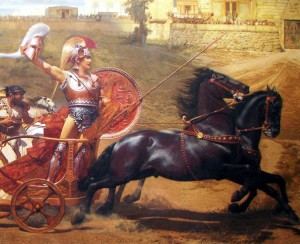Mythic Monday: the Warrior Achilles
In 2017, “Monster Mondays” are replaced by “Mythic Mondays,” a series dedicated to exploring the gods, legends, and mysteries—and yes, sometimes monsters, too—of world mythology.
January 2, 2017
Sing, O Goddess, the wrath of Achilles, son of Peleus…
So begins the tragic myth of Achilles as told in the Iliad, one of the oldest and most famous epic poems of ancient Greece. Achilles was the son of Peleus, the king of Phthia in Thessaly, a region of northern Greece. According to myth, his mother was Thetis, an immortal sea nymph. Achilles was not immortal, but at birth Thetis dipped Achilles in the underworld’s River Styx. The river’s magical waters gave Achilles a giant advantage: they made him invulnerable to any weapon. Well, nearly invulnerable…

This painting, The Triumph of Achilles, is on the upper level of the Achilleion, a palace dedicated to Achilles on the Greek island of Corfu. Credit: The Triumph of Achilles (1892), by Franz von Matsch; Achilleion Palace
The Iliad describes events in the final year of the Trojan War fought between Greece and the city of Troy. Agamemnon, the Greek king of Mycenae, recruited Achilles to fight with him against the Trojans. The Iliad describes Achilles as the mightiest warrior in all of Greece. But his pride, vanity, and overwhelming desire for glory in battle also made him stubborn, petty, brutish, and easily angered.
Achilles felt he was not being adequately rewarded for his services and quarreled often with Agamemnon. Eventually, Achilles refused to fight any longer and, without him, the Greek forces were doomed. Achilles’s closest friend, Patroclus, stole Achilles’s armor and joined the battle in his place. Patroclus was then slain by Hector, the greatest Trojan warrior, who thought he had killed Achilles. Enraged, Achilles returned to battle and killed Hector. To humiliate the Trojans, Achilles tied Hector’s corpse behind his chariot and dragged the body around the walls of Troy for days. The Iliad ends with Hector’s funeral, but other Greek legends describe the fate of Achilles and the eventual fall of Troy.
Tragically, Achilles knew he was destined to die in the war. The gods had offered him a choice: he could either be remembered forever through a short life of glory, or he could live a long life without fame. Achilles did not hesitate over his choice of a short, famous life. The Trojan War went on, then, and Achilles soon met his demise. According to legend, Hector’s brother Paris killed Achilles by shooting an arrow into his one vulnerable spot: the heel. When Achilles’s mother dipped him in the River Styx when he was a baby, she held him by the heel, a spot which remained dry and, thus, unprotected. The gods came through on their promise, however. The Trojan War took place around 1200 B.C., more than 3,000 years ago, but the legend and name of Achilles lives on.
Aside from mythology, Achilles and his one vulnerable spot live on in modern anatomy. The large tendon (tissue that connects muscle to bone) at the back of your ankle is known as the Achilles tendon—a vulnerable spot for many athletes and others.


